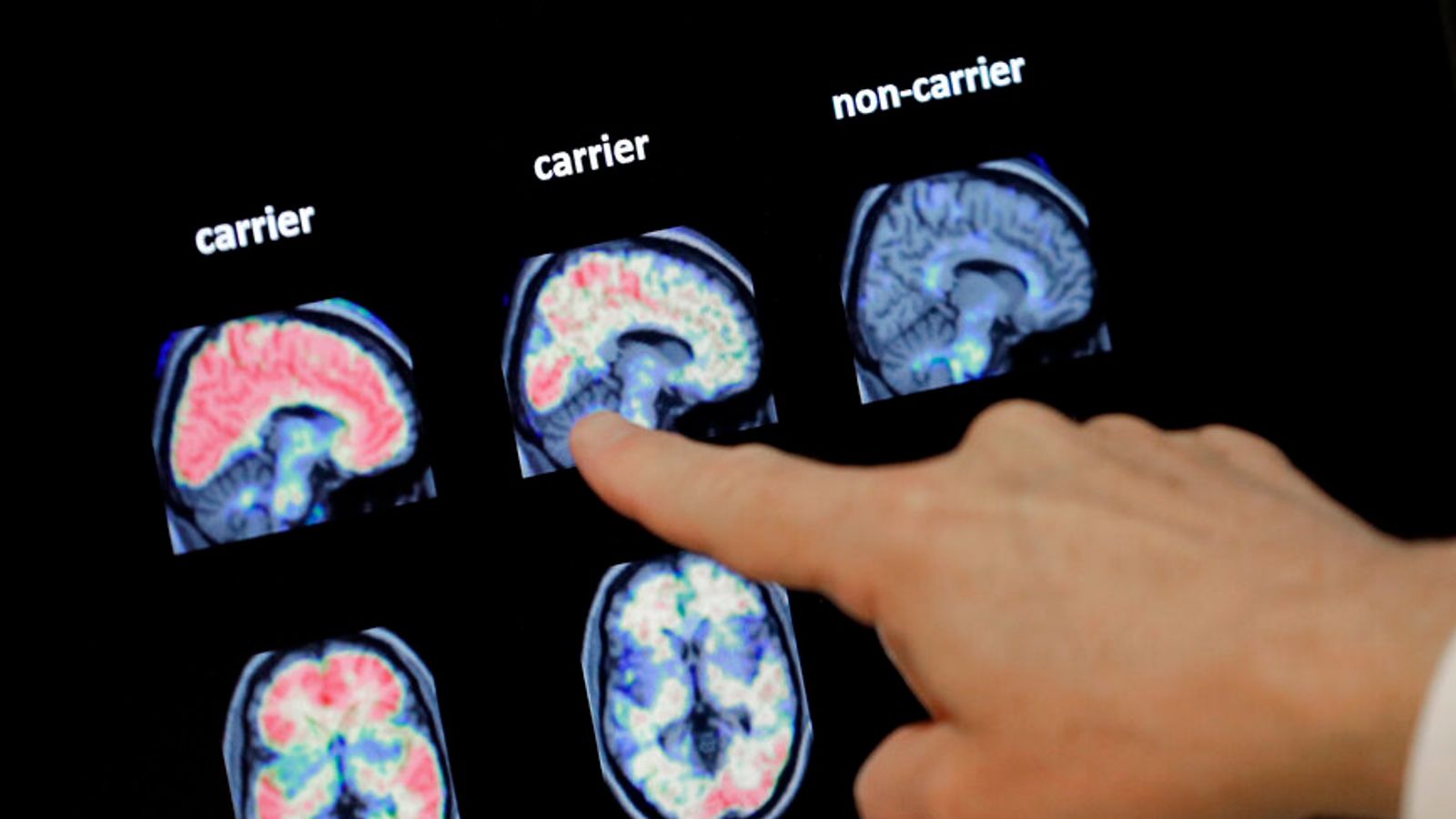Analysis
New Alzheimer’s drugs offer hope for bleak diagnosis but remain out of reach in UK
Estimates by Alzheimer’s Research UK and Alzheimer’s Society suggest 720,000 people in the UK would meet the treatment criteria used in the clinical trials of lecanemab and donanemab. But they need a diagnosis the NHS just can’t deliver.
Thomas Moore
Science correspondent @SkyNewsThomas
Monday 17 July 2023 13:16, UK
Listen to this article
0:00 / 2:59
1X
BeyondWords
Audio created using AI assistance
** HOLD FOR RELEASE/PUBLICATION DATE TBD FOR MEDICAL WRITER MARILYNN MARCHIONE STORY ** Dr. William Burke goes over PET brain scan Tuesday, Aug. 14, 2018 at Banner Alzheimers Institute in Phoenix. It may be too late to stop Alzheimer's in people who already have some mental decline but Banner is conducting two studies that target the very earliest brain changes while memory and thinking skills are still intact in hope of preventing the disease. (AP Photo/Matt York).
Image:
By the time the drugs are available some patients will have progressed so far that it may be too late for treatment. Pic: AP
Why you can trust Sky News
The NHS is nowhere near ready to provide the first effective Alzheimer’s drugs to the huge numbers of people who need them.
Estimates by Alzheimer’s Research UK and Alzheimer’s Society suggest 720,000 people in the UK would meet the treatment criteria used in the clinical trials of lecanemab and donanemab.
These drugs work best when given at the very first stages of Alzheimer’s, or earlier still when patients have what doctors call mild cognitive impairment.
But that needs a diagnosis the NHS just can’t deliver at the scale needed.
These are potent drugs with a small risk of brain swelling and brain bleeds.
So you need to be absolutely sure that brain fog, memory problems and decline in thinking skills really are due to Alzheimer’s before starting treatment. Otherwise you’d run the risk of side effects without any benefit.
But the amyloid protein, which builds up in the brain in people with the disease, can only be detected with certainty with a PET brain scan or by taking a sample of the spinal fluid.
MORE ON DEMENTIA
A scan at the Center for Alzheimer Research and Treatment in Boston
Donanemab found to slow Alzheimer’s and hailed a ‘turning point in fight against disease’
Hands of an elderly woman at home
New Alzheimer’s drugs could spell ‘beginning of the end’ for disease
MRI Brain Scan of head and skull with hand pointing
Alzheimer’s: First drug to slow progression of disease gains approval of US regulator the FDA
Related Topics:
Dementia
There are only 69 PET scanners in England, Wales and Northern Ireland, with a few more in Scotland. But only 10% of their time is in diagnosing Alzheimer’s; the bulk of their workload is in cancer.
And there aren’t enough clinics in the UK with the skilled professionals needed to do lumbar punctures, the procedure for inserting a needle into the spine to remove a sample of fluid.
Drugs offer hope for bleak diagnosis
The first of the drugs, lecanemab, has been available in the US for some patients since January, with full approval granted by the medicine’s regulator earlier this month.
But it could be early next year before the UK regulator decides whether to licence the treatment. And it would then need to be approved by NICE, the cost-effectiveness watchdog – in the US the drug costs around £20,000 a year.
Click to subscribe to the Sky News Daily wherever you get your podcasts
It’s frustrating for patients and their families.
These drugs offer some hope in what is otherwise a bleak diagnosis.
But they remain out of reach in the UK.
And by the time they are available some patients will have progressed so far that it may be too late for treatment.
Related Topics
Dementia






























